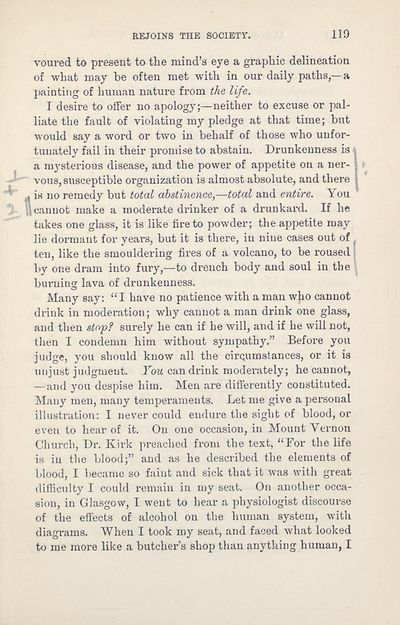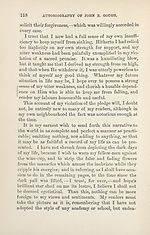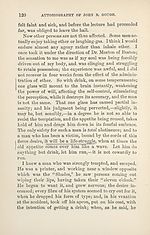Download files
Complete book:
Individual page:
Thumbnail gallery: Grid view | List view

REJOINS THE SOCIETY.
11!)
voured to present to the mind’s eye a graphic delineation
of what may be often met with in our daily paths,—a
painting of human nature from the life.
I desire to offer no apology;—neither to excuse or pal¬
liate the fault of violating my pledge at that time; but
would say a word or two in behalf of those who unfor¬
tunately fail in their promise to abstain. Drunkenness is i
a mysterious disease, and the power of appetite on a ner- ]
J ' vous, susceptible organization is almost absolute, and there i
j is no remedy but total abstinence,—total and entire. You
5 |\ cannot make a moderate drinker of a drunkard. If he
takes one glass, it is like fire to powder; the appetite may
lie dormant for years, but it is there, in nine cases out of
ten, like the smouldering fires of a volcano, to be roused j
by one dram into fury,—to drench body and soul in the
burning lava of drunkenness.
Many say: “I have no patience with a man who cannot
drink in moderation; why cannot a man drink one glass,
and then stop? surely he can if he will, and if he will not,
then I condemn him without sympathy.” Before you
judge, you should know all the cirqumstances, or it is
unjust judgment. You can drink moderately; he cannot,
—and you despise him. Men are differently constituted.
Many men, many temperaments. Let me give a personal
illustration: I never could endure the sight of blood, or
even to hear of it. On one occasion, in Mount Vernon
Church, Dr. Kirk preached from the text, “For the life
is in the blood;” and as he described the elements of
blood, I became so faint and sick that it was with great
difficulty I could remain in my seat. On another occa¬
sion, in Glasgow, I went to hear a physiologist discourse
of the effects of alcohol on the human system, with
diagrams. When I took my seat, and faced what looked
to me more like a butcher’s shop than anything human, I
11!)
voured to present to the mind’s eye a graphic delineation
of what may be often met with in our daily paths,—a
painting of human nature from the life.
I desire to offer no apology;—neither to excuse or pal¬
liate the fault of violating my pledge at that time; but
would say a word or two in behalf of those who unfor¬
tunately fail in their promise to abstain. Drunkenness is i
a mysterious disease, and the power of appetite on a ner- ]
J ' vous, susceptible organization is almost absolute, and there i
j is no remedy but total abstinence,—total and entire. You
5 |\ cannot make a moderate drinker of a drunkard. If he
takes one glass, it is like fire to powder; the appetite may
lie dormant for years, but it is there, in nine cases out of
ten, like the smouldering fires of a volcano, to be roused j
by one dram into fury,—to drench body and soul in the
burning lava of drunkenness.
Many say: “I have no patience with a man who cannot
drink in moderation; why cannot a man drink one glass,
and then stop? surely he can if he will, and if he will not,
then I condemn him without sympathy.” Before you
judge, you should know all the cirqumstances, or it is
unjust judgment. You can drink moderately; he cannot,
—and you despise him. Men are differently constituted.
Many men, many temperaments. Let me give a personal
illustration: I never could endure the sight of blood, or
even to hear of it. On one occasion, in Mount Vernon
Church, Dr. Kirk preached from the text, “For the life
is in the blood;” and as he described the elements of
blood, I became so faint and sick that it was with great
difficulty I could remain in my seat. On another occa¬
sion, in Glasgow, I went to hear a physiologist discourse
of the effects of alcohol on the human system, with
diagrams. When I took my seat, and faced what looked
to me more like a butcher’s shop than anything human, I
Set display mode to:
![]() Universal Viewer |
Universal Viewer | ![]() Mirador |
Large image | Transcription
Mirador |
Large image | Transcription
| Antiquarian books of Scotland > Temperance > Autobiography and personal recollections of John B. Gough > (131) |
|---|
| Permanent URL | https://digital.nls.uk/125988941 |
|---|
| Description | Thousands of printed books from the Antiquarian Books of Scotland collection which dates from 1641 to the 1980s. The collection consists of 14,800 books which were published in Scotland or have a Scottish connection, e.g. through the author, printer or owner. Subjects covered include sport, education, diseases, adventure, occupations, Jacobites, politics and religion. Among the 29 languages represented are English, Gaelic, Italian, French, Russian and Swedish. |
|---|

